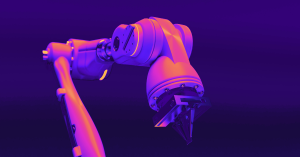Blockchain technology burst onto the scene with promises of decentralized transactions, immutable records, and disruptive potential across various industries. Initially introduced as the underlying technology for cryptocurrencies like Bitcoin, blockchain quickly captured the imagination of tech enthusiasts and innovators.
However, as with many revolutionary technologies, its introduction over the past few years raised a plethora of questions about its readiness for widespread adoption. Today, as we stand at the crossroads of AI-led technological advancement, it is crucial to evaluate how far blockchain has come, the extent of its adoption, and the challenges it faces on its path to mainstream implementation.
The potential of the technology to transform industries beyond finance, including supply chain, healthcare, real estate, and more, led to heightened expectations and fervent speculation. However, one can also argue that the technology was introduced ahead of its time, requiring extensive development, infrastructure, and education to reach its full potential.
According to Nikolay Denisenko, co-founder and CTO of Brighty App, a Swiss bank that combines crypto and fiat banking, there are both the benefits and concerns that blockchain brings to the table.
“From a social perspective, blockchain has the potential to empower individuals by granting them control over their data, assets, and digital identities, which could boost privacy, security, and freedom for people worldwide. Furthermore, the decentralized nature of blockchain can help reduce corruption, promote transparency, and foster trust among users,” Denisenko tells The Recursive.
However, there are concerns that the widespread adoption of blockchain could exacerbate existing inequalities and create new ones, he warns.
“For instance, access to the tech may be limited to those with the necessary resources and technical expertise, potentially excluding marginalized populations. The technology’s potential for anonymity could also facilitate illicit activities, such as money laundering and cybercrime,” Denisenko adds.
Blockchain to save the planet?
For people like Sandi Fatic, co-founder of blockchain infrastructure startup Calimero Network, the technology even has the potential to save the planet, as he outlined during his keynote address at the Green Future Conference in Split, Croatia last week.
“There is a lot of negative buzz about blockchain, like with the scams and stuff, but we don’t talk about the good stuff in the world. Many people are unbanked – 1.7 million people in the world, they don’t use banks, and they started using Bitcoin and blockchain. It also opened a big global market. The war in Ukraine as well – one of the things which the crypto community did was that we raised $187 million since last year to support humanitarian action inside Ukraine. And these things are not so talked about and I think they should be visible,” Fatic says.
Additionally, there are many use cases where blockchain technology is already making a difference, he argues.
“There are many use cases where ESG in FinTech can be combined with blockchain for example, energy, P2P rigs, monitoring how much electricity is being consumed, bill settlement markets for these environmental treaties – you could track how much funding is going to which environmental treaty. Then, you can tokenize the carbon credits, track them, trade them,see what the quality is, supply chains, and so on. So you could build a blockchain where every participant has a private key, and you can track the process from harvesting, landing, processing distribution to the consumer,” Fatic explains.
While there are big concerns about the mass adoption that would be needed for blockchain to really make a difference – for Fatic the process is already happening and there is no going back.
“I think many governments are working on adopting blockchain right now. People also say enterprises will never adopt blockchain. And I tell them: 10 years ago they said they would never adopt the cloud. Everybody uses cloud now. They said, You know, we don’t want to be digitalized. Today, everything is digitalized. Five years, 10 years from now, I think every business will run on a blockchain,” he points out.
Still a long way to go for blockchain to make a difference
For others, while blockchain is indeed here to stay, the current phase that the technology is in is still at its beginnings.
“We are certainly still in the early days of mass blockchain adoption and application and I would definitely consider us still in the ‘innovative stage’ of blockchain for years to come although there are real use case scenarios that are really taking off for blockchain,” Semir Gabeljic, director of digital asset hedge fund Pythagoras Investments, tells The Recursive.
According to Gabeljic, such use cases include the tokenization of real world assets such as real estate, gold, oil and gas, and so on.
“All of them are being tokenized and put on the blockchain to create more liquid markets in a transparent fashion. NFTs on blockchains have proved useful for patents, global brand campaign launches, and overall a way to authenticate a piece of art of a membership through the blockchain. However, there is still a long way to go and this will be a multi decade long transformation,” Gabeljic points out.
“The tokenization of assets provides a novel way for individuals to manage and transfer wealth securely. At the same time, certain types of smart contracts introduce a heightened level of fairness and balance in various transactions. Nevertheless, critics argue that blockchain’s potential benefits might come at the expense of specific sectors and jobs, as the technology could render some traditional roles obsolete,” Denisenko adds.
Furthermore, the past few years have also shown that blockchain has made significant strides, indeed attracting the attention of governments, enterprises, and innovators worldwide. Cryptocurrencies have gained prominence, while blockchain-based platforms and applications have emerged, offering enhanced security, transparency, and efficiency.
Yet, despite its notable progress, the widespread adoption of blockchain technology remains a work in progress, with several challenges impeding its path.
“I firmly believe that blockchain technology presents an unprecedented opportunity for a majority of individuals to significantly and enduringly enhance their freedom and liberty as citizens and individuals. Still, no matter how beautiful and empowering this may sound, we must remain vigilant about the technology’s potential risks and work towards ensuring that its benefits are shared equitably across society,” Denisenko concludes.








